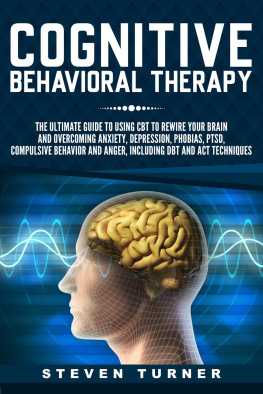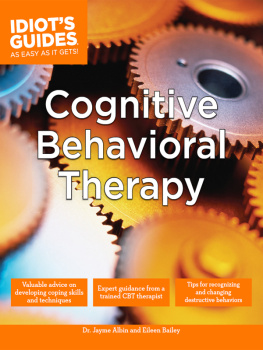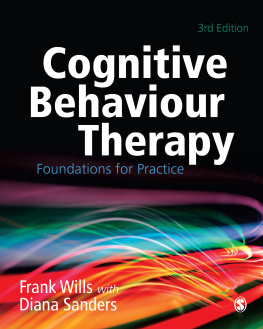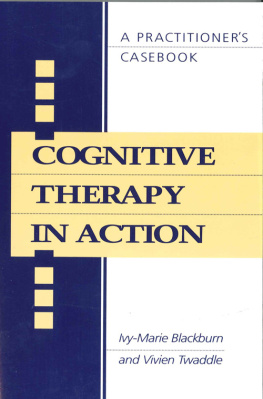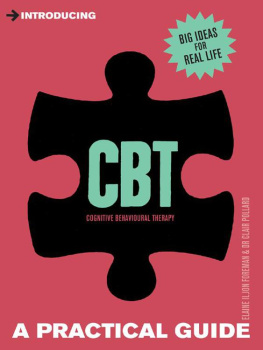Contents
Theories of Psychotherapy Series
Acceptance and Commitment Therapy
Steven C. Hayes and Jason Lillis
Adlerian Psychotherapy
Jon Carlson and Matt Englar-Carlson
The Basics of Psychotherapy: An Introduction to Theory and Practice
Bruce E. Wampold
Behavior Therapy
Martin M. Antony and Lizabeth Roemer
Brief Dynamic Therapy
Hanna Levenson
Career Counseling
Mark L. Savickas
CognitiveBehavioral Therapy
Michelle G. Craske
CognitiveBehavioral Therapy, Second Edition
Michelle G. Craske
Cognitive Therapy
Keith S. Dobson
Emotion-Focused Therapy
Leslie S. Greenberg
Emotion-Focused Therapy, Revised Edition
Leslie S. Greenberg
ExistentialHumanistic Therapy
Kirk J. Schneider and Orah T. Krug
Family Therapy
William J. Doherty and Susan H. McDaniel
Feminist Therapy
Laura S. Brown
Gestalt Therapy
Gordon Wheeler and Lena Axelsson
Interpersonal Psychotherapy
Ellen Frank and Jessica C. Levenson
Narrative Therapy
Stephen Madigan
Person-Centered Psychotherapies
David J. Cain
Psychoanalysis and Psychoanalytic Therapies
Jeremy D. Safran
Psychotherapy Case Formulation
Tracy D. Eells
Psychotherapy Integration
George Stricker
Rational Emotive Behavior Therapy
Albert Ellis and Debbie Joffe Ellis
Reality Therapy
Robert E. Wubbolding
RelationalCultural Therapy
Judith V. Jordan
Copyright 2017 by the American Psychological Association. All rights reserved. Except as permitted under the United States Copyright Act of 1976, no part of this publication may be reproduced or distributed in any form or by any means, including, but not limited to, the process of scanning and digitization, or stored in a database or retrieval system, without the prior written permission of the publisher.
Electronic edition published 2017.
ISBN: 978-1-4338-2752-5 (electronic edition).
Published by American Psychological Association 750 First Street, NE Washington, DC 20002 www.apa.org | To order APA Order Department P.O. Box 92984 Washington, DC 20090-2984 Tel: (800) 374-2721; Direct: (202) 336-5510 Fax: (202) 336-5502; TDD/TTY: (202) 336-6123 Online: www.apa.org/pubs/books E-mail: |
In the U.K., Europe, Africa, and the Middle East, copies may be ordered from
American Psychological Association
3 Henrietta Street
Covent Garden, London
WC2E 8LU England
Cover Designer: Minker Design, Sarasota, FL
Cover Art: Lily Rising, 2005, oil and mixed media on panel in craquelure frame, by Betsy Bauer
The opinions and statements published are the responsibility of the authors, and such opinions and statements do not necessarily represent the policies of the American Psychological Association.
Library of Congress Cataloging-in-Publication Data
Names: Craske, Michelle G.
Title: Cognitive-behavioral therapy / Michelle G. Craske.
Description: Second edition. | Washington, DC : American Psychological Association, [2017] | Series: Theories of psychotherapy series | Includes bibliographical references.
Identifiers: LCCN 2016045613 | ISBN 9781433827488 | ISBN 1433827484
Subjects: LCSH: Cognitive therapy. | Behavior therapy.
Classification: LCC RC489.C63 C73 2017 | DDC 616.89/1425dc23 LC record available at https://lccn.loc.gov/2016045613
British Library Cataloguing-in-Publication Data
A CIP record is available from the British Library.
Second Edition
http://dx.doi.org/10.1037/0000027-000
Contents
Series Preface
S ome might argue that in the contemporary clinical practice of psychotherapy, evidence-based intervention and effective outcome have overshadowed theory in importance. Maybe. But, as the editors of this series, we dont propose to take up that controversy here. We do know that psychotherapists adopt and practice according to one theory or another because their experience, and decades of good evidence, suggests that having a sound theory of psychotherapy leads to greater therapeutic success. Still, the role of theory in the helping process can be hard to explain. This narrative about solving problems helps convey theorys importance:
Aesop tells the fable of the sun and wind having a contest to decide who was the most powerful. From above the earth, they spotted a man walking down the street, and the wind said that he bet he could get his coat off. The sun agreed to the contest. The wind blew, and the man held on tightly to his coat. The more the wind blew, the tighter he held. The sun said it was his turn. He put all of his energy into creating warm sunshine, and soon the man took off his coat.
What does a competition between the sun and the wind to remove a mans coat have to do with theories of psychotherapy? We think this deceptively simple story highlights the importance of theory as the precursor to any effective interventionand hence to a favorable outcome. Without a guiding theory we might treat the symptom without understanding the role of the individual. Or we might create power conflicts with our clients and not understand that, at times, indirect means of helping (sunshine) are often as effectiveif not more sothan direct ones (wind). In the absence of theory, we might lose track of the treatment rationale and instead get caught up in, for example, social correctness and not wanting to do something that looks too simple.
What exactly is theory? The APA Dictionary of Psychology defines theory as a principle or body of interrelated principles that purports to explain or predict a number of interrelated phenomena. In psychotherapy, a theory is a set of principles used to explain human thought and behavior, including what causes people to change. In practice, a theory creates the goals of therapy and specifies how to pursue them. Haley (1997) noted that a theory of psychotherapy ought to be simple enough for the average therapist to understand, but comprehensive enough to account for a wide range of eventualities. Furthermore, a theory guides action toward successful outcomes while generating hope in both the therapist and client that recovery is possible.
Theory is the compass that allows psychotherapists to navigate the vast territory of clinical practice. In the same ways that navigational tools have been modified to adapt to advances in thinking and ever-expanding territories to explore, theories of psychotherapy have changed over time. The different schools of theories are commonly referred to as waves, the first wave being psychodynamic theories (i.e., Adlerian, psychoanalytic), the second wave learning theories (i.e., behavioral, cognitivebehavioral), the third wave humanistic theories (person-centered, gestalt, existential), the fourth wave feminist and multicultural theories, and the fifth wave postmodern and constructivist theories (i.e., narrative, solution-focused). In many ways, these waves represent how psychotherapy has adapted and responded to changes in psychology, society, and epistemology as well as to changes in the nature of psychotherapy itself. Psychotherapy and the theories that guide it are dynamic and responsive. The wide variety of theories is also testament to the different ways in which the same human behavior can be conceptualized (Frew & Spiegler, 2012).




